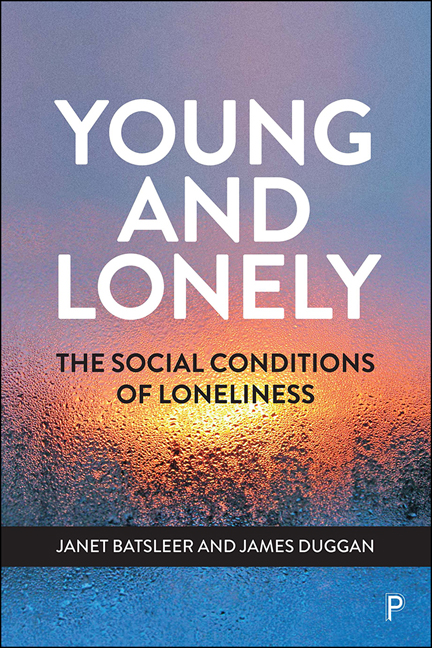Book contents
- Frontmatter
- Contents
- Notes on the Authors
- Acknowledgements
- Preface
- 1 Animate, Attune, Amplify
- 2 Finding Oneself a Loneliness Agenda
- 3 I’M New Here: Creating a New Research Project and A Young Person Led Research Agenda
- Part I The Social Conditions of Loneliness
- Part II The Experience of Loneliness
- Part III Building Friendship and Connection
- References
- Index
10 - Online Spaces and Connection
Published online by Cambridge University Press: 18 March 2021
- Frontmatter
- Contents
- Notes on the Authors
- Acknowledgements
- Preface
- 1 Animate, Attune, Amplify
- 2 Finding Oneself a Loneliness Agenda
- 3 I’M New Here: Creating a New Research Project and A Young Person Led Research Agenda
- Part I The Social Conditions of Loneliness
- Part II The Experience of Loneliness
- Part III Building Friendship and Connection
- References
- Index
Summary
It is seemingly paradoxical that the most connected generation in human history, young people now, are lonely. We were once promised the Internet would be populated by interfacing ‘netizens’ and ‘digital natives’ experiencing greater personal and global connection, increasing cultural understanding that in turn augured an era of peace and cooperation (Hauben, 1995; Prensky, 2001). In 2006, ‘You’ was voted the Time Person of the Year in recognition of the unnamed masses that contributed, commented and posted online (Time, 2006). Books with titles such as Wikinomics (Tapscott and Williams, 2006) and Here Comes Everybody (Shirky, 2008) described how Internet technologies were redefining business, society and our lives through mass collaboration online. Yet within decades we face the apparent negative consequences for young people's social and emotional lives.
A prominent theme in the loneliness media discourse is that social media make you lonely (Obordo, 2018; Redhead, 2019), diminish mental health and, with sustained use, cause conditions such as depression (Wakefield, 2018; Campbell, 2019). There are studies that identify links between young people's use of social media and declining well-being, mental ill health and loneliness (Kross et al, 2013; Appel et al, 2016; Woods and Scott, 2016; Booker et al, 2018). There is, however, research that details the various positive affordances of social media and online communities for young people identifying as LGBTQI+ (Hanckel et al, 2019). Writers present persuasive cases that social media technologies are relentlessly designed, developed and refined to be addictive in order to maximise our attention and so capture more of our valuable data (Seymour, 2019). Neuroscience research, however, remains contested over whether social media are addictive or are significantly ‘re-wiring’ young people's brains as is sometimes feared (Kardefelt-Winther et al, 2017).
In this chapter we question the simplistic and deterministic relationships between youth loneliness or young people's experience of growing up with social media and the Internet. Indeed, we should locate our contemporary debate in the historical series of moral panics about new technologies. As with the Internet and social media, the birth of the landline telephone was seen as both a threat to friendship by displacing face-to-face communication and an opportunity to connect lonely people, especially in rural places (Thomson, 2016).
- Type
- Chapter
- Information
- Young and LonelyThe Social Conditions of Loneliness, pp. 105 - 118Publisher: Bristol University PressPrint publication year: 2020



